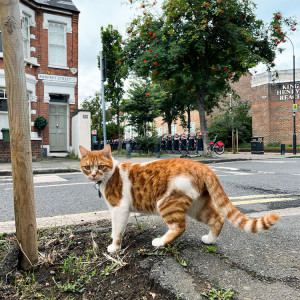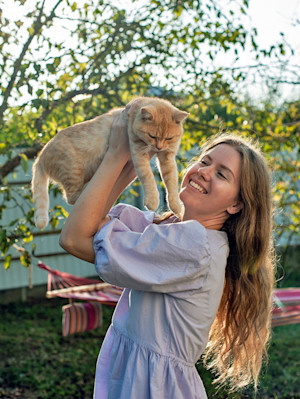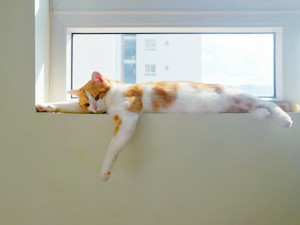How to Stop Your Outdoor Cat From Moving in With Your Neighbours
Thanks to your neighbour’s treats, your kitty’s over-the-fence visits are starting to become uncomfortably regular...

Share Article
As every pet parent will know, cats can be a little fast and loose with their allegiances. Sometimes, it doesn’t matter whether they’re spoiled or not, they’ll still opt for what they see as a better offer. Sometimes that’s small, like my cat Beverley for example, who will jump at the chance to sit on a stranger’s lap. Does it matter that I feed her, play with her and give her treats? Of course not. If there’s a comfier pair of legs to sit on, they’re hers.
But sometimes, your cat’s fickle nature could have more serious repercussions. In my local area for instance, Facebook groups are full of tales of a woman who has set up an array of cat houses in her back garden and regularly places cat food and treats out to entice the local feline population over for a visit.
Unfortunately, several cats have all but left their own homes and effectively moved in. When neighbours have knocked on her door to reclaim their cat – so the Facebook lore goes – she has greeted them with indifference. They’re an outdoor cat, she tells them. They can do as they please.
Not every neighbourhood has someone this calculated, but there are plenty of well-meaning people who don’t understand what outdoor cats are like. If they feed the cat, often they will return. If they make a fuss of the cat, of course they’ll come back.
So, what can you do as the loving parent of an outdoor cat to stop them from spending all their time at your neighbours’ place? Unfortunately, a frank conversation with your kitty about the dangers of overeating, the proximity of the busy road to their new hangout and a reminder of how much money you spend on a carefully chosen and nutritious diet for them to enjoy at home is unlikely to make much of a difference.
What other options are there?
Why might a cat switch allegiances?
There are a few reasons a cat might be drawn to another household. Food is always a common reason. If someone else offers a food they prefer (or more of it), they might return there frequently. A random neighbour won’t know about the special food you might give your cat for health reasons, or how expensive it is to purchase regularly. And your cat, as loving as they may be, probably won’t care. If it tastes better, and is available more regularly, it could be more appealing.
“Cats are inherently territorial animals and generally like to live in their familiar environment,” says Daniel Warren-Cummings, central behaviour officer for Cats Protectionopens in new tab. “Many cats will, however, seek refuge elsewhere if there is a sudden change in their home environment or routine which causes them stress, for example new pets or family members, home renovations or even loud noises at home which force cats to seek calmer environments elsewhere.”
My vet once told me that my cat Ness was stressed and that the cause could have been something as small as having moved furniture around. A new environment then, might be calmer or quieter for the cat and offer them a form of refuge. It doesn’t necessarily mean they don’t like you!
What are some signs that my cat is hanging out somewhere else?
There are a few signs that your cat might be hanging out somewhere else. The most obvious clue is that they are spending less time at home. If you are in a position to track the time they spend outdoors, such as with a microchip cat flap or a GPS cat tracker, a change of routine or significantly more time spent outside might indicate that they are visiting another home.
A change in eating habits at home is another key indicator. If your cat seems less interested in eating at home, or changes weight unexpectedly, they might be eating food elsewhere. My cats love their routine of having a portion of wet food at the same time every evening. If either of them began to show less interest in this, for instance, I’d be concerned that they were eating somewhere else instead.
I think my cat is spending time with the neighbour, does it mean they don’t like me?
Not necessarily. Unfortunately, cats can be opportunistic and do enjoy their own routines, comfort and stability. If they have found comfort or a routine elsewhere that they like, it doesn’t mean that they no longer care for you. Rather, they’re satisfying their needs (either for food, attention or stimulation) somewhere else perhaps in addition to your place. Cats will often roam between houses and still return to their original pet parents for comfort and affection.
What’s the problem if my cat has a second home?
Aside from the mental blow that comes along with knowing your kitty has other caregivers (it’s OK, you’re human), there is the potential for some serious health repercussions. Not all cat food is particularly healthy or nutritious, for instance. Plus, a random stranger feeding your cat won’t know about any health requirements your cat may have.
Overfeeding and obesity are the most likely health problems to arise. Cats are common overeaters, which itself can contribute to the development of various health issues such as diabetes or joint problems.
The other danger of your cat eating elsewhere relates to toxic foods. There are certain foods that are dangerous to cats, such as onions, garlic or chocolate. A stranger without cats of their own might not know or consider this, and it risks exposing your cat to dangerous foods. You also don’t know what other animals at this home are like, or how hygienic the place is. This in itself might cause potential health risks to your pet.
Other situational hazards may also be a concern. Does their new hangout spot require crossing a busy road to get to, for instance? Does the garden have a shed which is easy to get into and not so easy to get out of?
Can I take legal action if someone is feeding my cat?
Most people, despite what the internet would have you believe, are pretty agreeable in person. Before considering anything legal, ask your neighbour nicely to stop feeding your cat, explaining that whilst you’re glad your kitty has another caregiver to keep an eye out for them, getting food elsewhere could be putting their health at risk.
If confrontation isn’t your thing, a note through their door could work. Even something as simple as adding a collar with a name tag on (you can get them with QR codesopens in new tab you can add a message to these days) could alert well-meaning neighbours that your cat has a home to go back to.
“In practice, most people who feed other peoples’ cats do so in the well-meaning and honest belief that the cats are strays, have no owners and are hungry,” says Daniel Warren-Cummings. “From a legal point of view, cats are regarded as property but recent changes also now recognise their sentience. The removal or taking of a cat without authority or lawful excuse could be considered an offence under the new Pet Abduction Act 2024 (in England and Northern Ireland).”
Just feeding a cat is a far cry from abducting a cat, of course, but in 2020, a West London couple sued their neighbouropens in new tab after she refused to stop feeding their family cat. The case was settled outside of court, with the neighbour agreeing to stop. Whilst expensive, it does mean there is some legal recourse available if someone refuses to stop feeding your cat – if you’re willing to pay for it.
What can I do to stop my cat from wanting to find food or comfort elsewhere?
Unless you want your cat to become an indoor cat, which involves a major lifestyle change that may not be fair to a moggie who has grown up with access to the great outdoors, you may have to accept that you can’t always control the actions of your outdoor cat.
If your cat craves the outdoors but you’re determined to keep them close to home then consider using cat boundary fencing (if you’re lucky enough to have an outdoor space). Common options are invert and overhang fences, which stop the cats from going over the top of your fence they cannot bend their spines in a concave shape.
Fencing brand Protect a Petopens in new tab, for instance, uses metal brackets that have mesh netting attached that will not support a cat’s weight. However, these options can be expensive, only available to home owners and you should check with your neighbours before installing as they can be a little oppressive.
Other options to help keep a cat close to home include creating a ‘catio’. More common in the United States, where outdoor cats are less common (due to more predatory wildlife like coyotes, hawks and even bears), catios are an enclosed space that give your cats the chance to experience the outside without letting them roam free. Catio kits can be expensive (and not landlord friendly), but our US site has a handy guide for DIY-ing a catio on a budgetopens in new tab.
If your outdoor cat has been feeding somewhere else and you don’t want to force them inside permanently, a recommended tactic is to keep them shut inside with a litter tray for at least a month. This will help the cat acclimate to what they think of as their home. This is similar to how you would shut them in after moving to a new home so that they can properly adjust to a new area.
Elsewhere, although you’re already an excellent cat parent (after all, you’re here reading this piece), there’s always opportunities to raise your game and make your cat feel more secure and satisfied at your place. Some examples include making sure your cat has a designated quiet spot for hiding away if they need alone time. You could also try upping your enrichment efforts to keep their mind and body active and stimulated. (Ideas inspiration for cat enrichment strategies here).
Make sure ‘their’ areas in your home – litter trays, water fountains, food bowls and beds – are clean, tidy and easily accessible with minimal risk of disturbance. After all, if someone kept interrupting your dinner at home, wouldn‘t you start looking to dine elsewhere?
You can, of course, take the route of spoiling your cat to within an inch of their life, but it’s certainly not worth jeopardising their health by upping the treats in a misguided attempt at bribery.
Essentially, you may have to accept that you can’t control all of your outdoor cat‘s behaviours. You can however, control your actions and make sure that your cat’s needs are fully met at home. Keep providing a secure, warm space with a healthy, yummy diet and you might just be able to reduce their desire to seek food and comfort somewhere else.
George Fallon
George is a writer whose work has featured in Business Insider, Now Then Magazine and Zone Coverage. He has two cats named Ness and Beverley. George is a Minnesota Timberwolves obsessive from Cornwall who named his tortie Bev after the infamous NBA player Patrick Beverley.
Related articles
![A ginger and white cat standing on a London street.]()
Is It Safe to Have an Outdoor Cat in the UK?
Free-roaming felines are much more common here than in other parts of the world – we uncover the reasons why
![]()
How To Create a Cat-Safe Garden
Green fingers at the ready
![A man sitting on the floor with a woman lying in his lap holding a shit and grey cat in her arms in the air.]()
How to Move House With Your Cat
Who is more stressed, you or your feline?
![cat lying on windowsill looking sad]()
How Long Can I Leave My Cat Home Alone?
With automatic feeders and self-cleaning litter trays, your cat could technically look after themselves... but should they?
![two men with black hair stroke their cat who is sticking his tongue out]()
Lost For Over A Decade – How Cats Miraculously Manage To Find Their Way Back Home
Cats are famous for turning up again weeks, months and even years after they disappear. But why? And how do they do it?
![]()
How Cats Hunt
Cats have evolved to be skilled hunters, but how and why do they still do it?









